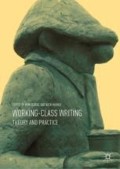Abstract
This chapter discusses the influence of class-based inequality on scholarly writing in relation to the current reevaluation of “critique” as a scholarly norm. Building on prior theorizations of class-inflected rhetoric, it advocates for the freedom to write enthusiastically, to address embodied experiences and to be honest about class. Class is approached from a phenomenological perspective, drawing attention to the ways that lived experience shapes readers’ interactions with texts. Attending to hermeneutic processes that include life outside of texts, scholars who write frankly about their class backgrounds empower readers from similar backgrounds in the still very unequal world of higher education.
Access this chapter
Tax calculation will be finalised at checkout
Purchases are for personal use only
Works Cited
Carnevale, Anthony P., Nicole Smith, Michelle Melton, and Eric W. Price. 2015. Learning While Earning: The New Normal. Report from the Center on Education and the Workforce. Georgetown University.
Charlesworth, Simon. 1999. A Phenomenology of Working-Class Experience. Cambridge: Cambridge Universitry Press.
Christian, Barbara. 1987. The Race for Theory. Cultural Critique 6: 51–63.
Clancy, Kim. 1997. Academic and Anarchist. In Class Matters: Working-Class Women’s Perspectives on Social Class, ed. Pat Mahony, Christine Zmroczek, 45–54. London: Taylor & Francis.
Felski, Rita. 2000. Nothing to Declare: Identity, Shame and the Lower Middle Class. PMLA 115 (1): 33–45.
———. 2008. The Uses of Literature. Oxford: Wiley-Blackwell.
———. 2009. After Suspicion. Profession 2009 (1): 28–35.
———. 2015. The Limits of Critique. Chicago: University of Chicago Press.
Fisher, Jonathan, and Timothy M. Smeeding. 2016. Income Inequality. Pathways: A Magazine on Poverty, Inequality and Social Policy. Special Issue: State of the Union: The Poverty and Inequality Report.
Freedman, Diane P., and Olivia Frey. 1993. Introduction. Durham: Duke.
Gil, Natalie. 2014. One in Seven Students Work Full-Time While They Study. Guardian, August 11.
Grusky, David B., Marybeth J. Mattingly, and Charles E. Varner. 2016. Executive Summary. Pathways: A Magazine on Poverty, Inequality and Social Policy. Special Issue: State of the Union: The Poverty and Inequality Report.
Hanley, Lawrence. 2003. Dialogue: The Status of ‘Experience’ in Working-Class Cultural Studies: Working-Class Cultural Studies in the University. Radical Teacher: A Socialist, Feminist, and Anti-racist Journal on the Theory and Practice of Teaching 68: 26–31.
Hochschild, Arlie. 2016. Strangers in Their Own Land: Anger and Mourning on the American Right: A Journey to the Heart of Our Political Divide. New York: The New Press.
Hoggart, Richard. 1994. A Measured Life: The Times and Places of an Orphaned Intellectual. London: Routledge.
hooks, bell. 2000. Where We Stand: Class Matters. New York: Routledge.
Jones, Owen. 2016. Chavs: The Demonization of the Working Class. London: Verso.
Lecourt, Donna, and Anna Rita Napoleone. 2011. Teachers With(Out) Class: Transgressing Academic Social Space Through Working-Class Performances. Pedagogy: Critical Approaches to Teaching Literature, Language, Composition, and Culture 11 (1): 81–108.
Marion, Jean-Luc. 2013. Givenness and Hermeneutics. Milwaukee: Marquette University Press.
Medhurst, Andy. 2000. If Anywhere: Class Identification and Cultural Studies Academics. In Cultural Studies and the Working Class: Subject to Change, ed. Sally Munt, 19–35. Bloomsbury, London: Cassell.
Pell Institute and PennAHEAD. 2017. Indicators of Higher Education Equity in the United States: 2017 Historical Trend Report.
Perera, Sonali. 2014. No Country: Working-Class Writing in the Age of Globalization. New York: Columbia University Press.
Polanyi, Michael. 2015 [1958]. Personal Knowledge: Towards a Post-critical Philosophy. Chicago: University of Chicago Press.
Ricoeur, Paul. 1977. Freud and Philosophy. New Haven: Yale University Press.
Rimstead, Roxanne. 2001. Between Theories and Anti-theory: Moving Towards Marginal Women’s Subjectivities. 1995, Rpt. In What We Hold in Common: An Introduction to Working-Class Studies, ed. Janet Zandy, 182–199. New York: The Feminist Press at CUNY.
Ruiz, Roman, and Laura W. Perna. 2017. The Geography of College Attainment: Dismantling Rural ‘Disadvantage’. In Indicators of Higher Education Equity by The Pell Institute and PennAHEAD, 94–102.
Sedgwick, Eve Kosofsky. 1997. Paranoid Reading and Reparative Reading; or, You’re So Paranoid, You Probably Think This Introduction Is About You. In Novel Gazing: Queer Readings in Fiction, ed. Sedgwick, 1–40. Durham: Duke University Press.
Smarsh, Sarah. 2016. Dangerous Idiots: How the Liberal Media Elite Failed Working-Class Americans. Guardian, October 13.
Spivak, Gayatri Chakravorty. 1999. A Critique of Postcolonial Reason: Toward a History of the Vanshing Present. Cambridge: Harvard University Press.
Walkerdine, Valerie. 1990. Schoolgirl Fictions. New York: Verso.
Weis, Lois, Kristin Cipollone, and Heather Jenkins. 2014. Class Warfare: Class, Race, and College Admissions in Top-Tier Secondary Schools. Chicago: University of Chicago Press.
Wyner, Joshua S., John M. Bridgeland, and John J. DiIulio, Jr. 2009. Achievement Trap A Report by the Jack Kent Cooke Foundation & Civic Enterprises: How America Is Failing Millions of High-Achieving Students from Lower-Income Families.
Author information
Authors and Affiliations
Corresponding author
Editor information
Editors and Affiliations
Rights and permissions
Copyright information
© 2018 The Author(s)
About this chapter
Cite this chapter
Falke, C. (2018). Meaning It: Everyday Hermeneutics and the Language of Class in Literary Scholarship. In: Clarke, B., Hubble, N. (eds) Working-Class Writing. Palgrave Macmillan, Cham. https://doi.org/10.1007/978-3-319-96310-5_4
Download citation
DOI: https://doi.org/10.1007/978-3-319-96310-5_4
Published:
Publisher Name: Palgrave Macmillan, Cham
Print ISBN: 978-3-319-96309-9
Online ISBN: 978-3-319-96310-5
eBook Packages: Literature, Cultural and Media StudiesLiterature, Cultural and Media Studies (R0)

